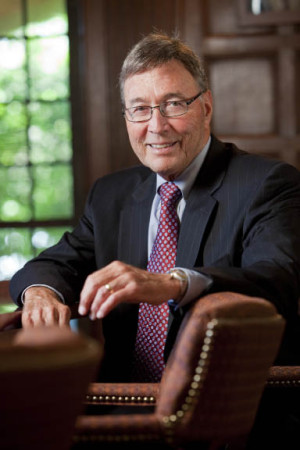Westchester Community College president Joseph Hankin is retiring after 42 years as leader of the State University of New York in Valhalla.
The nation”™s longest-serving community college president, Hankin announced his retirement at his annual State of the College address to faculty, staff and administrators.

The college board of trustees granted him a leave of absence in 2014, during which he will assist trustees in the college”™s search for a new president. A college spokesman said the long-time campus leader also will assist in WCC”™s “visibility and outreach efforts” as well as other program and services development projects.
“The accomplishments achieved over the past four decades have been realized because of the joint effort of a team of individuals,” Hankin said in his address.
Those accomplishments during a presidential tenure that began in 1971 include the formation of a faculty and professional staff that has received more SUNY Chancellor”™s Awards for Excellence than any similarly-sized institution, according to WCC spokesman Patrick Hennessey. Hankin”™s support for an expanded continuing education division has helped make it the largest such program in New York. And he was instrumental in the fundraising successes of the Westchester Community College Foundation.
In accepting Hankin”™s retirement, WCC board chairman Timothy Carey called him “the ”˜soul”™ of the institution.”
SUNY Chancellor Nancy L. Zimpher said Hankin for more than 40 years “has led Westchester Community College with the highest level of distinction, fostering productive and impactful connections with students, faculty and staff on campus and elevating the college”™s presence and partnership with the local community. The college will be forever defined by President Hankin”™s tenure, and his many contributions to SUNY and to New York state throughout his leadership will benefit generations to come.”
The college plans to hire a national search firm to assist in the hunt for his replacement, a process that could take a full year, Hennessey said. WCC trustees will name an interim president after conferring with the SUNY board of trustees.





















I wonder if this might be a good time to point out that Dr. Hankin is and has been for years, the most handsomely recompensed public employee in Westchester County. Dr. Hankin’s current salary is $234,886. The college also provides him a vehicle, the county pays for some number of “professional-development” expenses, and Westchester Community College Foundation offers him up to $13,000 for various “out-of-pocket” expenses.
The salary of the Westchester County Executive, by way of comparison, is about $161,000.
On the other hand, during Dr. Hankin’s long tenure–the nation’s longest in such a position–Westchester Community College ceased to rely on a mostly full-time and reasonably compensated full-time faculty, and came to rely more and more on part-time adjunct faculty who must seek new positions at the end of every semester, whose hours are capped, who are paid about 1/3 per course what traditional full-timers earn, and who receive few benefits of any kind.
I cannot report the exact numbers, because they are and have been for some time very unevenly reported. For instance, according to the website http://www.mla.org/acad_work_data?id=197294 of the Modern Language Association, which keeps track of the national higher ed trend to rely more and more on very low-cost adjunct and contingent faculty, Westchester CC employs (by 2009) 214 full-time faculty, or so-called “regular tenure-stream faculty,” and 309 non-tenure track faculty–part-time adjuncts. Yet, according to the current WCC adjunct faculty handbook, and in such handbooks for the past 6 years, there are reported only 170 or fewer full-time faculty, and more than 800 part-time adjunct faculty. Furthermore, until two years ago, there were NO numbers listed in faculty handbooks or other college-provided and publicly available materials, to indicate that ANY adjuncts, who have been decades now the majority WCC faculty, were working at the college.
Even on the current college website, under “Fact Book” for 2012-13 NO adjunct or other part-time faculty employees are reported, only, (here the figure is 165) full-time “teaching faculty.” http://www.sunywcc.edu/cms/wp-content/uploads/2012/04/2012-2013-Final-Fact-Book.pdf
The MLA site in referred to above, by the way, depends on federally reported numbers, numbers sent by colleges and universities, to IPEDS, which is the US Department of Education’s Integrated Postsecondary Education System (IPEDS).
So, depending on what source you use, you might conclude, either, and quite falsely, that WCC employs only a small group of full-time “regular” faculty, or, more accurately, that WCC teaching is overwhelmingly the responsibility of part-time adjunct faculty. Perhaps this Is one of Dr. Hankin’s “impactful connections,” in the praiseful language of SUNY Chancellor Nancy L. Zimpher, but it is not clear.
I am quite sure that it is a key function of the press to report news of the retirement of a well-known public figure like Dr. Hankin, and to report laudatory remarks in regard to his career made by such figures as Timothy Carey, chairman of the WCC board, which body after all has overseen Dr. Hankin’s long employment. However, it is clear that there are other interesting matters to explore in regard to the important role that WCC plays in the region’s educational, political, and economic life.
Dr. Alan Trevithick, adjunct professor of sociology and anthropology, Westchester Community College, Laguardia Community College, and Fordham University, member, Adjunct Committee, WCCFT, and board member, New Faculty Majority: The National Coalition for Adjunct and Contingent Faculty.